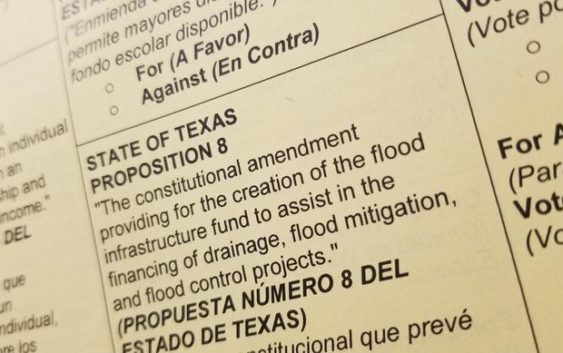- Weather Impact Alert: Heavy rain could lead to flooding across Carolinas
- North Carolina legislators fleshing out details on $500M in additional Hurricane Helene relief
- Dangerous travel conditions: Ice, snow and flooding possible
- How photos lost in disasters like Hurricane Helene find their way home, with a little help from people who care
- Dangerous travel conditions, ice/snow and flooding possible in the mountains Tuesday and Wednesday
Commentary: Climate Change On The Texas Ballot

On Tuesday, Nov. 5, Texans are voting on 10 proposed changes to the Texas Constitution. Although climate change doesn’t appear to be anywhere on the ballot, Texas Public Radio commentator Yvette Benavides says it’s there.
Hurricane Harvey made landfall three times in six days and caused $125 billion in damage in August of 2017, according to the National Hurricane Center. About 13 million people were affected by that storm, and nearly 135,000 homes were damaged or destroyed. The death toll was placed at 88 by the Texas Department of Health Services. The majority of deaths – 62 – were caused by wind, rain, and floods, which led to drownings or other fatal accidents. The news of this weather event had us all in its thrall during that wall-to-wall coverage of people standing on rooves of houses or floating along their neighborhoods on makeshift boats — waiting to be rescued.
As stunning as these dire scenes and statistics are, in the very next legislative session after that Category 4 storm, state lawmakers passed no laws that called on state agencies to account for the growing cost of climate change.
As Texans go to the polls on Tuesday to decide 10 constitutional amendments, they should be aware that they are being asked to respond to a growing global crisis.
Three of the props directly or indirectly deal with the impacts of climate change. This, even though the Texas state government doesn’t recognize that climate change is real and has not done what over a dozen other states have done in adopting policies to deal with it.
Proposition 8 calls for a “constitutional amendment providing for the creation of the flood infrastructure fund to assist in the financing of drainage, flood mitigation, and flood control projects.” More rain means more flooding and this flood infrastructure fund will require no new taxes or bonds. And what better way to fund it than from the Texas Rainy Day Fund?
Proposition 3 would authorize a temporary property tax exemption for disaster areas. Currently a property is listed on the tax rolls at pre-disaster valuation until the next valuation cycle. This means someone who saw their house destroyed in a hurricane could still be required to pay full value in property taxes. If local governments in Texas had the power to reappraise the value of damaged properties within a governor-declared disaster area, Proposition 3 would authorize the legislature to require local governments to provide tax exemptions.
Proposition 2, if passed, allows the Texas Water Development Board to issue up to $200 million dollars in bonds. The ballot measure would require the bonds to be used for developing the water supply and sewer service in areas defined as economically distressed. Because of climate change, not only will flooding become more common, but so too will drought. The paradox is just another consternating feature of the effects of global warming — which too often is more political football than disquieting knell. Parts of Texas are going to see water shortages. Drought, of course, isn’t new to Texas, but according to the Texas Water Development Board a water crisis is looming.